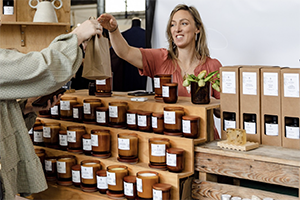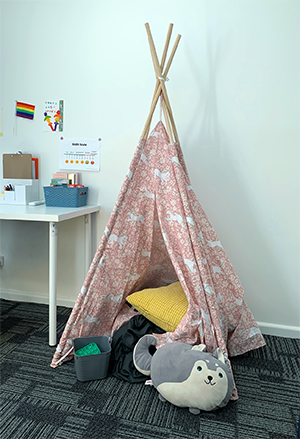 Christmas is a time for celebration and excitement and with this comes lots of bright lights, colourful decorations and loud noises. However, there is a growing trend amongst retailers to introduce a “quiet hour” that minimises sources of sensory overload for neurodivergent shoppers.
Christmas is a time for celebration and excitement and with this comes lots of bright lights, colourful decorations and loud noises. However, there is a growing trend amongst retailers to introduce a “quiet hour” that minimises sources of sensory overload for neurodivergent shoppers.
Neurodivergent refers to a divergence from what is considered typical in mental or neurological function and is often used to describe people with ADHD, autism and other sensory-processing conditions.
 Calming tent at Spencer HealthThe festive period can be particularly challenging for anyone with sensory related processing issues. According to Emma Spencer, CEO and Principal Clinical Psychologist at Spencer Health, during the festive period not only do we have shopping centres trying to create a holiday vibe with Christmas music, bright lights and colourful displays; you also have large crowds of people swarming into the centres to do their Christmas shopping.
Calming tent at Spencer HealthThe festive period can be particularly challenging for anyone with sensory related processing issues. According to Emma Spencer, CEO and Principal Clinical Psychologist at Spencer Health, during the festive period not only do we have shopping centres trying to create a holiday vibe with Christmas music, bright lights and colourful displays; you also have large crowds of people swarming into the centres to do their Christmas shopping.
Emma reports that health professionals agree that there are many people who present with sensory related processing issues that interfere with their everyday wellbeing. Sensory avoidance and seeking behaviours are one of the major diagnostic features of Autism and in fact affect all areas of the individual’s life. Not all people with Autism have sensory processing issues, but a large proportion do.
The difficulty with the increased number of people is not only the noise that this brings, but also the chance of being bumped into. Emma says the whole experience is a lot for a brain to process and can be overwhelming. Further, it can actually be physically painful depending on your sensory sensitivities and many people with sensory processing disorders feel pain when their sensory vulnerabilities are triggered.
Emma stresses that for Autistic individuals with sensory related sensitivities, these can affect all areas of their life. It can impact how they navigate the world, how they manage their feelings, how they behave in relationships. Sensory avoidance behaviours create overwhelm and distress. Those who engage in sensory seeking and soothing behaviour can sometimes become so engrossed that they lose touch with the world around them.
Kmart, Woolworths and Coles have all successfully introduced a quiet hour and now even markets such as Handmade Canberra, attended by over 25,000 visitors on a market weekend, have introduced a low-sensory shopping hour. Julie Nichols from Handmade Canberra says that their first low sensory market in October was well received by both visitors and stallholders and they will be offering it again at their Christmas Market in December. She described feedback from one visitor who was excited to bring her teenage daughter. They would not normally attend the market because the sensory overload leaves her daughter feeling drained and with heightened anxiety, however they were able to enjoy the low-sensory experience leaving before the market got too busy.
Emma says there are a number of things businesses can do to meet the needs of neurodivergent shoppers, not just during the Christmas period. “At Spencer Health, we don’t have bright colours, sounds and smells, we have some low arousal pictures on the walls and try to have reduced clutter around so that everything feels low arousal. One of the team has a “calming tent” in their therapy room for her clients to crawl into. We also have fidget toys in each of the rooms."
Emma offers the following 5 tips for small businesses wanting to take their first steps into being more sensory-friendly during the Christmas period:
- Consider offering a low-arousal room or a quiet room where shoppers or visitors can retreat for a break (similar to a breastfeeding room).
- Dim the lights and turn off flashing lights to make the shop or venue less bright.
- Turn down or switch off the Christmas music and limit PA announcements to make it less noisy.
- Have a map or signage that indicates areas where there might be more noise, bright lights or clutter.
- Similar to the restrictions many businesses implemented during the COVID-19 pandemic, consider limiting the number of shoppers in the space at one time or offer appointment times.
For more information on Spencer Health visit https://spencerhealth.com.au/
For mare information on Handmade Canberra's Low Sensory Shopping Hour visit https://handmadecanberra.com.au/low-sensory-shopping/


